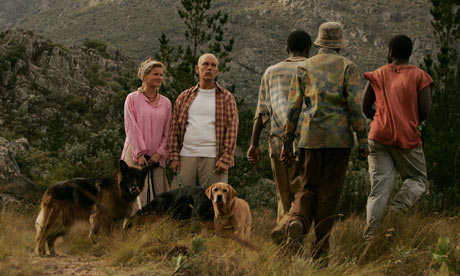Race and Disgrace

At a dinner party in London a few years ago, I was once again professing my admiration for the work of Coetzee when a writer I had just met interrupted to say that he thought Disgrace was a racist novel. When I asked him what could have led to such a bleak assessment, he replied that no black character in the book is complex and that the novel gives a pessimistic view of the new, post-apartheid South Africa. To bolster his claim, he cited Coetzee’s self-imposed exile from the country as a clear indicator of lack of faith in its future. This was the first time I had heard that argument, but it certainly wasn’t the last; it came up in an email conversation with another friend very recently.
I think that this charge of racism is tied specifically to the scene in which three unknown black men attack the farm where Lucy, Professor Lurie’s daughter, lives and works. Lurie is locked in the bathroom while his daughter is raped. In this life-changing moment, Lurie thinks:
He speaks Italian, he speaks French, but Italian and French will not save him here in darkest Africa. He is helpless, an Aunt Sally, a figure from a cartoon, a missionary in cassock and topi waiting with clasped hands and upcast eyes while the savages jaw away in their own lingo preparatory to plunging him into their boiling cauldron. Mission work: what has it left behind, that huge enterprise of upliftment? Nothing that he can see.
It is easy to see how a quick reading of that passage can lead to the kind of charge my friend was making: there is that phrase, ‘darkest Africa;’ there is the image of the missionary in the cauldron; there is the choice of ‘lingo’ instead of ‘language’; and there is the questioning of the benefit of the mission civilisatrice. Some readers might see this as proof of racism, but I think the problem with this interpretation is that it ascribes to J.M. Coetzee the point of view of David Lurie.
In Disgrace, Coetzee uses a third-person limited point of view, so the thoughts we are reading are Lurie’s. And Lurie is very much an apartheid-era man, someone who believes that European colonization of Africa served the larger, nobler goal of ‘civilizing’ the natives. The rape of his daughter further solidifies his views, however ignorant or incorrect they may be. But in fact Coetzee subverts the narrative of ‘black sexual predators’ much earlier on, when he presents us with an identical, inverted story. Notice, for instance, that the professor refuses to acknowledge that he has assaulted Melanie, who, we are told, is a woman of color (“Meláni, the dark one.”) When Lurie forces himself upon Melanie, he describes the scene as “not rape, not quite that.” Again, the use of the third-person limited point of view allows us to see that Lurie forgives himself for the sexual assault while at the same time he is outraged at his daughter’s fate. These complexities are, I think, what make the novel a subtle and compelling portrait of the cyclical nature of power and violence.
Photo: Still from the film adaptation of Disgrace. Credit: Fortissimo Films. I haven’t seen the film yet, but I am not sure if it can capture the subtlety of the novel.